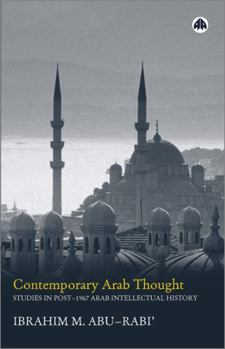Contemporary Arab Thought: Studies in Post-1967 Arab Intellectual History
Contemporary Arab Thought is a complex term, encompassing a constellation of social, political, religious and ideological ideas that have evolved over the past two hundred years -- ideas that represent the leading positions of the social classes in modern and contemporary Arab societies. Distinguished Islamic scholar Ibrahim Abu-Rabi' addresses such questions as the Shari'ah, human rights, civil society, secularism and globalization. This...
Format:Paperback
Language:English
ISBN:0745321690
ISBN13:9780745321691
Release Date:January 2004
Publisher:Pluto Press (UK)
Length:485 Pages
Weight:1.50 lbs.
Dimensions:1.0" x 6.0" x 8.8"
Customer Reviews
2 ratings
Impressive
Published by Thriftbooks.com User , 15 years ago
A critical examination of Arab leadership and associated agendas, a criticism of culture vs. religion and Arab idealization of all things Western. Not a tough read but an intensive one. The scholarship is impressive. I read most of it for an article on a related topic. A fabulous resource for anyone interested in Islam, Arabs, or the Middle East in general.
A critical study of the contemporary Arab thoughts
Published by Thriftbooks.com User , 19 years ago
According to the author, this book is written as a self-criticism addressed to Arab and Muslim intellectuals, especially those who reside in the West. The Arab intellectuals or Muslims alike, who have received Western education and have decided to live in Western countries in the first half of twentieth century, have actually benefited from their modern secular education. However, the large number of educated Arab people does not always fulfill the promise of transformation of the social conditions of the Arab World. Far from being `organic intellectuals,' most Arab thinkers in the West as well as the elite in the Arab world have been party to Western capitalist interests that aim to control the Arab World. By no means denigrating the works of Isma`il Raji al-Faruqi, Edward Said, Ghada Hashem Talhami, or the feminist Leila Ahmad, to mention some brilliant Arab intellectuals, most Arab thinkers in the West seem to have forgotten the social conditions of the Arab world that have been in acute crisis since the mid nineteenth century or from the time colonialism stepped into the Arab world. Pseudo modernization ?to say that there has never been any modernization as it emerged from the middle class as in Europe, but was initiated mainly by the elites? has kept Arab intellectuals in the West completely in the dark and unable to offer radical solution to the crises of the Arab world. What are the fruits of `modern' Arab thought since the nineteenth century? It is precisely in answering the question that this book has its significance as self-criticism. After briefly explaining the color of Arab thoughts from the Islamist, the nationalist, the liberalist, and the Marxist as written in the second part of the book, Abu-Rabi`, the professor of Islamic Studies at Hartford Seminary, convincingly argues that Arab intellectuals have not yet found a viable formulation of modernism which is based on the social conditions of the Arabs. The author said in his sarcastic words; "the Arab discussion of modernity is guided more by confusion than by anything else" (197). The author also laments that many Arab and Muslim intellectuals "have taken modernity for granted without delving into its violent and cruel beginning" (197). One of the benefits of colonialism and capitalism in the Arab world is the shaken situation where many Arabs realized that they live in a backward condition and all people seem to agree that this crisis needs to be overcome. However, implementing modernity, which is Eurocentric in nature, without considering the social condition of the Arab societies, is not a good choice. The author suggests, "modernization cannot be effective without a modernist consciousness and modernist values" (151). It is in this point that the Arab's liberal and Marxist movements have failed to implement their ideal goals into the Arab people. While modernism in Europe has been the natural process of the society, modernism in the Arab world is absorbed by the Arab bourgeoi





